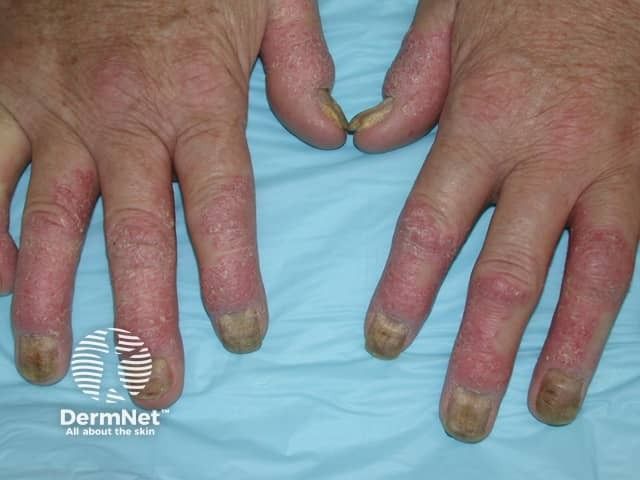In a recent conversation with Dermatology Times, Roland Chen, MD, senior vice president of drug development in immunology and cardiovascular at Bristol Myers Squibb, shared key insights from the pivotal POETYK PsA-1 and PsA-2 trials that supported the supplemental New Drug Application (sNDA) for deucravacitinib in psoriatic arthritis (PsA).1 The trials demonstrated significant improvements in both joint and skin symptoms, with sustained efficacy through 52 weeks and a safety profile consistent with its established use in plaque psoriasis.2 With simultaneous regulatory submissions in the US, EU, Japan, and China, Bristol Myers Squibb aims to address ongoing unmet needs in PsA treatment by offering deucravacitinib as a differentiated oral option with a unique TYK2 mechanism of action.
Q&A
Dermatology Times: What were the main takeaways from the trials that led to the sNDA for deucravacitinib for PsA?
Chen: The POETYK PsA-1 and POETYK PsA-2 trials demonstrated that once-daily deucravacitinib was effective at improving both the joint and skin manifestations of PsA, with a significantly greater proportion of deucravacitinib-treated patients achieving at least a 20 percent improvement in signs and symptoms of disease after 16 weeks of treatment compared with placebo. Key secondary endpoints were also met in both studies, such as the Health Assessment Questionnaire-Disability Index (HAQ-DI) score, 36-Item Short Form Survey (SF-36) Physical Component Summary (PCS) score and Minimal Disease Activity (MDA) response. Importantly, in POETYK PsA-2 we saw that meaningful clinical responses continued to improve, and outcomes were maintained through week 52. We look forward to presenting additional data, including week 52 results from POETYK PsA-1, in the future.
DT: Can you speak to the importance of simultaneous regulatory submissions in the US, EU, Japan, and China?
Chen: Despite available therapies, a significant proportion of patients with PsA continue to experience treatment dissatisfaction and suboptimal disease management across geographies. We think that deucravacitinib can fill this need and have executed an accelerated global filing strategy is designed to help us reach our goal of bringing deucravacitinib to as many appropriate patients as possible around the world.
DT: How does the safety profile observed in PsA compare to those we’ve seen in plaque psoriasis?
Chen: The safety profile observed in our pivotal trials for deucravacitinib in PsA was consistent with the established safety profile seen in our trials for moderate to severe plaque psoriasis, where deucravacitinib has already been approved in more than 50 countries worldwide. No new safety signals were observed which further bolsters our confidence in potentially bringing this novel oral medicine to patients around the world.
DT: If approved, where do you see deucravacitinib fitting into current PsA treatment guidelines?
Chen: If approved for this indication, deucravacitinib will be well-positioned in rheumatology as a targeted oral therapy for those with moderate to severe PsA inadequately managed by csDMARDs. As a selective TYK2 inhibitor, deucravacitinib offers a differentiated mechanism of action and provides a valuable oral alternative to injectables or biologics for patients and clinicians seeking targeted options.
DT: What should clinicians know about this therapeutic option as we approach the target PDUFA date?
Chen: Deucravacitinib has demonstrated a consistent safety and efficacy profile in moderate to severe plaque psoriasis over more than 20,000 patient years of experience. Our POETYK PsA data are compelling and underscore deucravacitinib’s efficacy in both skin and joint manifestations of PsA. Moreover, the results show that patients experienced improvement across a wide range of clinical measures of disease activity. These finding highlight deucravacitinib’s potential as a first-line, targeted oral therapy, which is a route of administration that may be preferred by many patients as compared to injectables.
References
- Bristol Myers Squibb’s supplemental new drug application (sNDA) for sotyktu (deucravacitinib) for the treatment of adults with active psoriatic arthritis accepted for review across four regions globally. News release. BioSpace. Published July 21, 2025. Accessed July 31, 2025. https://www.biospace.com/press-releases/bristol-myers-squibbs-supplemental-new-drug-application-snda-for-sotyktu-deucravacitinib-for-the-treatment-of-adults-with-active-psoriatic-arthritis-accepted-for-review-across-four-regions-globally
- US Food and Drug Administration approves sotyktu (deucravacitinib), oral treatment for adults with moderate to severe plaque psoriasis. News release. Bristol Myers Squibb. Published September 9, 2022. Accessed July 31, 2025. https://news.bms.com/news/details/2022/U.S.-Food-and-Drug-Administration-Approves-Sotyktu-deucravacitinib-Oral-Treatment-for-Adults-with-Moderate-to-Severe-Plaque-Psoriasis/default.aspx
